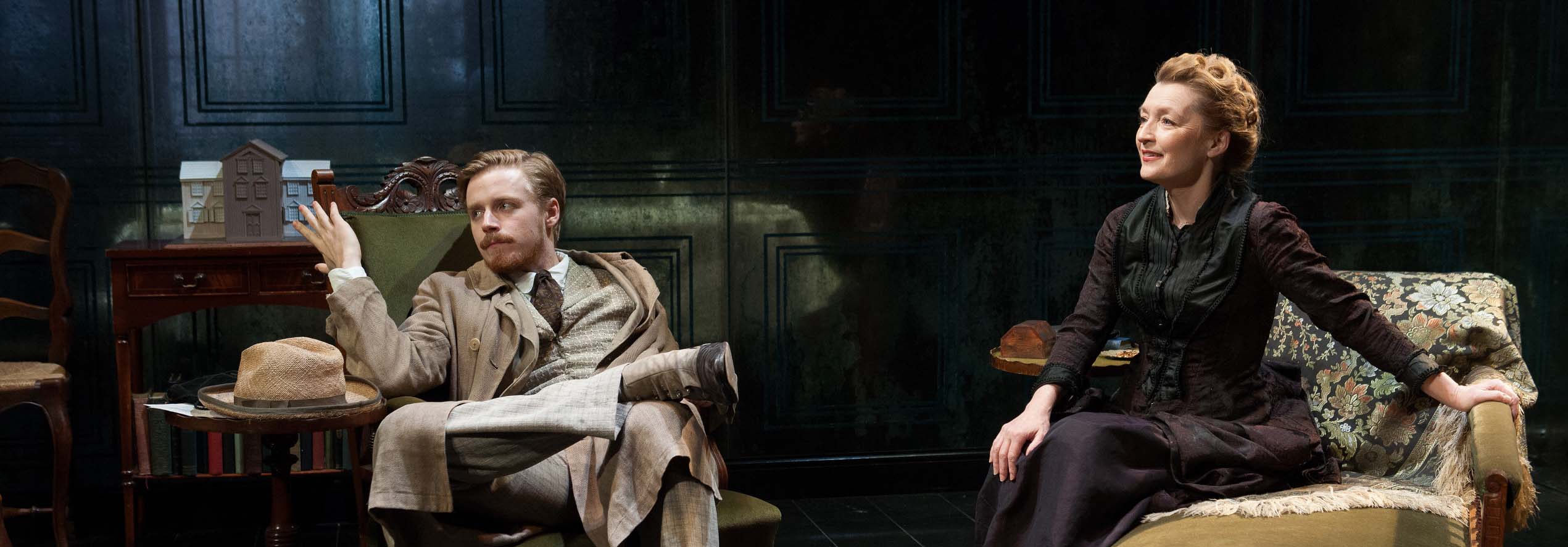Ghosts haunts Trafalgar Studios with tragic sincerity
The heartbreaking performances at the core of the Almeida’s production of Ghosts have created a production that pairs emotional suffering with intimate scrutiny. It is the only production in the current repertoire to have received a Critics’ Circle Theatre Award last week; Lesley Manville won the award for Best Actress for her role as Helene Alving. The show also recently announced it would be extending its transfer run at Trafalgar Studios until 22 March 2014.
Even as the audience took to its seats, arranged close together in the tight rows at Trafalgar Studios, the stage felt oppressively small and close to the audience. The set, beautifully designed by Tim Hatley, is layered three spaces deep, divided by glass screen walls. A living room is exposed downstage, with the tarnished glass wall partially obscuring a dining room behind and another wall that looks beyond to the outside; to the village; to everywhere beyond this claustrophobic, private sphere. These semi-transparent walls allow the audience a perspective denied to the characters on stage. Even the furniture, which leaves little space to move about, is dark hardwood and made up with saturated olive green upholstery. Everything about the set is intense in the way it regulates the characters’ behaviour in the space. Significantly, the only props to move about repeatedly are the books that Helene Alving (Lesley Manville) has begun to conceive her own ideas by, the books that prompt the Adam Kotz’s hilarious but pitiful assertion as the Pastor that everything he says is what someone else has said first.
In Ghosts, Ibsen considers the legacy of the late Mr Alving’s debauchery, both on the ten years of isolation and suffering experienced by his wife, Helene, and in the inheritance of his son (Jack Lowden), who had held his father high in a position of esteem. The first performances were deemed obscene and revolting; today they continue to challenge. Richard Eyre’s modern adaptation has been almost unanimously praised and something profound happens to your conception of humanity, suffering and art, in relation to this play.
Lesley Manville plays Helene with extraordinarily bold inner strength that has produced a defiance against her own vulnerability. At times, she is strong in being flippant, as she signs deeds to the orphanage, chucking her writing implements into the draw and shoving her chair under the table with terrifying assurance. She is strong in her challenge to the Pastor’s moral goodness, in upholding the sanctity of a marriage that in fact built a facade around her suffering. But yet it is as she struggles and fights this inner strength, while the world she has built up – and it is her world, we believe with all certainty that this Helene maintained the estate through her husband’s sustained drunken debauchery – breaks down. This struggle produces our utter sympathy for her, in the strength it takes to confess her years of pain. Her self-effacing sacrifice for a son she sent away, towards a husband she couldn’t love and against herself, is upheld by Manville in a performance that is difficult to give justice to.
Even as the lights came down and the audience began to pay their respects in applause, I felt unbearably unable to participate as Manville’s tears pooled down her cheeks while the cast took their bow. At the same time, heartfelt respect for the cast and the vision that made a production so terribly exhilarating made applause the only expression possible in response to it.
Richard Eyre, who has adapted Ghosts for the modern stage, writes in the production’s programme notes that the play faces the greatest of life’s enemies, which are not only ‘social repression and superstition’ but ‘to be bored with life and indifferent to its suffering’. Eyre forces this on us in a very real way, with the cathartic genesis of a blood red dawn concluding the play. Red and orange suffuse up the backdrop, like a perverted tequila sunrise, which recalls the destructive glow of the fire, as part of Peter Mumford’s elegant lighting design. This vivid sunrise is attended simultaneously with bird song heralding a new beginning. But a new beginning of what? We are suspended in a final moment on the edge of destruction with the rest of Helene’s life indeterminably ahead of her. In response to the production, it feels impossible to be bored with life, having been confronted with the possibility of such emotional suffering and perhaps redemption.
The publicity shows Lesley Manville in a solarised photograph like a Man Ray portrait, her ghostly, black and white dress fading into the title: Ghosts. And like the ghosts of Helene’s stifling past and the effects carried through into the life of her son, this production affects you with haunting sincerity.
Ghosts is an Almeida Theatre production and its West End run at Trafalgar Studios ends 22 March 2014.

Comments (2)